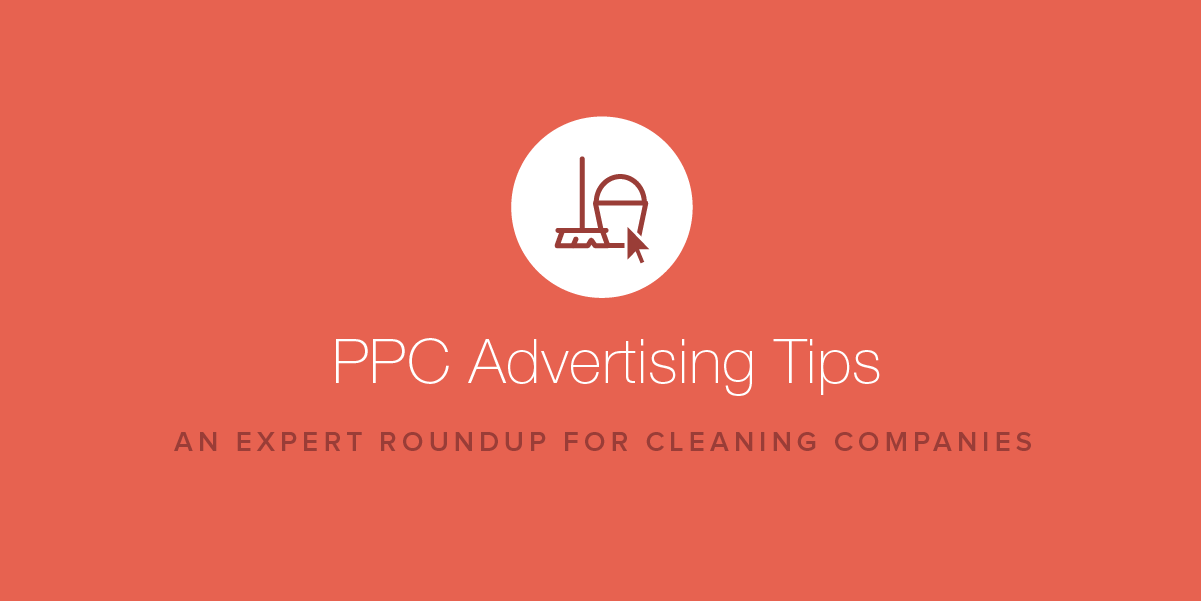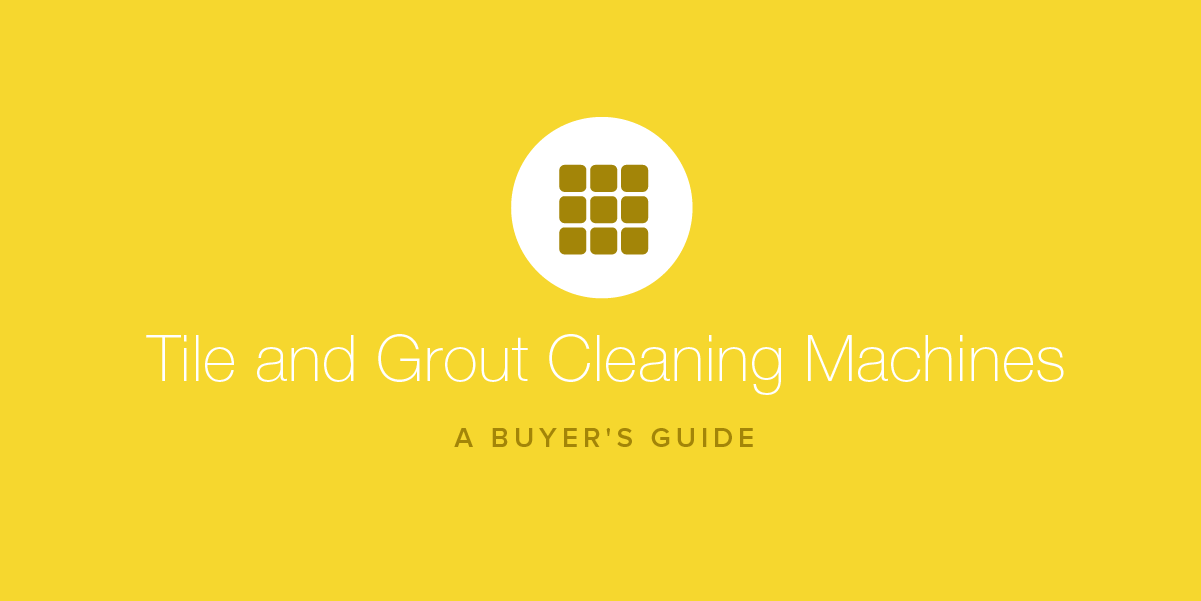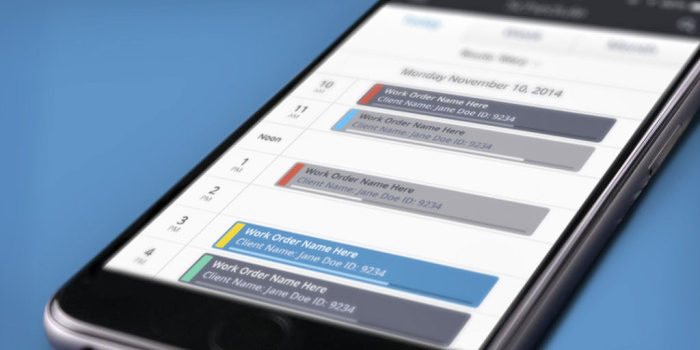PPC Advertising Tips for Cleaning Companies
- June 30, 2019
- By: Vonigo
We asked the experts: What pay-per-click (PPC) advertising advice do you have for cleaning companies? We received plenty of insightful responses from owners, marketers and PPC experts.
1. David Mulqueen, Senior Marketing Manager, Odd Dog Media

GET SPECIFIC! One area of success I have seen with my client, Ladonna’s Cleaning Service, is getting really specific with the services we promote.
For example, they are a general cleaning company but have found that really honing in on services like “Construction Cleaning” or “Move Out Cleaning” drives much more relevant and quality leads over something like “House Cleaning Services.”
These are areas that are really seasonal for us and we hit them really hard during the summer months. Not only have we seen an increase in the quality of leads but we’ve also seen a reduction in CPC (cost per click) and CPA (cost per acquisition).
2. David Pagotto, Founder of SIXGUN

There are five main mistakes we see cleaning companies continually making with their PPC campaigns:
- Not using location targeting effectively
- Using broad match keywords (instead of broad match modified keywords, phrase, or exact match keywords)
- Not effectively structuring their Campaigns and Ad Groups
- Not activating ad extensions (such as the local business extension, or phone number extension)
- And not writing compelling copy for the ads themselves
Ultimately, cleaning companies need to take a step back and familiarise themselves further with the fundamentals of PPC and Google Ads to get the best ROI possible.
3. Sean Parry, Founder of Neat Services
At Neat Services, We clean hundreds of homes every week, and PPC has been one of the major growth drivers behind our business.

My primary role at Neat is managing our online marketing, of which PPC is a major part. We spend thousands of dollars every month on PPC, with all PPC management done in-house. Here are three key items to focus on:
1. Focus on Search Terms
Our first port of call in our weekly Google Ads review is the Search Terms report. This is simply the specific list of words that people type into Google, which brings up your ad and leads to them clicking.
Particularly at the start of a new campaign, it’s very likely that the “quality” of the search term report will vary quite significantly. You’ll need to identify which words or phrases are not relevant to your business, and ideally get to a point where at least 90% of the search terms are ones you’d want to show up for your ads.
As an example, if you’re a house cleaning company (but don’t offer carpet cleaning) and you see some people clicking on your ad but they’ve searched using the term “carpet cleaning”, then you should add the keyword “carpet” to your negative keyword list. A tighter search terms report will lead to a higher conversion rate and a more profitable PPC campaign, so this is something you need to be reviewing regularly.
2. Keep Things Simple
With Google Ads, there’s a huge number of variables you can test for. You can send different ads to people in different locations, either male or female, different age groups, and even different interests. The options are really limitless. Given this, it’s very easy for your Google Ads account to get out of control and way too complex with numerous campaigns, ad groups and keywords.
Keep the 80/20 rule in the front of your mind. If 80% of your traffic is going to 20% of your keywords, then focus on just those keywords. Keep an eye on the other 80%, but really all your effort should be to focus on those things that could have the biggest impact.
This is far easier to do when you’re running a tight campaign with a manageable number of ad groups and keywords.
3. Always Be Testing Ad Copy
Once you have a campaign that’s been running for a few months, and you have a high-quality Search Terms report, the next major item to focus on is ad copy.
You should have at least two ads running for the same keyword, so you can compare their performance. Pick the best-converting one every month, and then replace the underperforming ad with a new ad (a different title and different text).
By only having one ad running, you’ll never be able to continually improve. By testing one against another, the performance of your ad campaign can only continue to improve over time. This is yet another reason why you want to have a relatively simple campaign structure.
4. Stacy Caprio, Founder of Growth Marketing

One tip for cleaning companies to get a better ROI on their ad investments is to target all ads locally in the areas they service. If they are targeting areas outside of their service zone, they are essentially throwing money in the toilet (no pun intended).
Another way to maximize the local targeting with Facebook ads is to target friends of people who have already liked your Facebook Page. When friends see the advertisement, they will also see that their friend or acquaintance has already liked your cleaning service’s Page. It’s more likely they will reach out and try to schedule a job if someone they know and trust already likes your company.
5. Todd Friedman, Founder of Kiraly Marketing

A cleaning company who wants to use PPC will more than likely, at some point, be required to go up against big websites like handy.com and TaskRabbit. Especially if you’re located in a medium-to-large city.
You’ll want to think deeply about what keywords you’ll want to target. When I say deep I don’t mean meditate on it, you have to dig deep and get specific. Instead of “cleaning company near me” which is what many will bid on (and you should as well), think of specific services you provide and what cities/ towns you provide service to. For example instead of just “cleaning company near me,” you’d want to focus on “kitchen and bathroom cleaning Miami” ….if your business is in Miami.
Another great tool to utilize is call-only ads and call extensions. This will allow prospective customers to call you directly from a PPC ad.
Lastly, thinking about what the ad says. More often than not, advertisers who do PPC write very BORING ads. If you’re going up against large companies in your market, you MUST stand out.

6. Ricardo Velez, Content Associate at Fundera

For cleaning companies looking to get a better return on their ad spend, I suggest utilizing negative keywords.
Negative keywords are a type of keyword that prevents your ad from being triggered by a particular word or phrase. Using cleaning companies as an example, a negative keyword could be “cleaning services -jobs”. Someone looking for a cleaning service job is not interested in hiring your company to clean their house. Without this negative keyword (-job), you end up spending money on an ad that is of no interest to the searcher.
You can build up a nice list of negative keywords by simply searching for your primary keywords. Add negative keywords for any of the results that appear that aren’t a cleaning service company. Implementing negative keywords into your PPC strategy will have an immediate impact on your ROAS (return on ad spend). Once you have negative keywords in place, the people that click on your ads will have the intention of looking for a cleaning service company — and thus a higher chance of converting.
7. Collin Slattery, Founder of Taikun Digital

Use granular location breakdowns in your ad groups, and have a good query, ad copy, and landing page agreement for these location terms.
For example, if someone is looking for a “brooklyn carpet cleaner” your ad heading and ad copy should include “brooklyn” and your landing page should also be “brooklyn.” Ad copy and landing pages that contain New York City instead of Brooklyn will have worse performance.
By creating ad groups that group Location + Service keywords together and having ad copy and landing pages that mirror those Location + Service keywords, you will get higher quality scores which means lower click costs, and you’ll get better conversion rates and higher ROI. So examples of ad groups in this structure could be:
Brooklyn Carpet Cleaners
Manhattan Carpet Cleaners
NYC Carpet Cleaners
Queens Carpet Cleaners
8. Jamie Burgess, PPC Account Manager, Cariad Marketing

When working with a limited budget, as most small businesses generally are, you have to be smart with your targeting and keywords to minimize the chance of wasted ad spend.
Make sure the locations you’re running campaigns in are right for your target market, and your ad scheduling is set for sensible times (usually business hours) vs 24/7.
Create your campaigns around keywords you know are relevant to your business, such as [service] and [service location], and use a mixture of ‘exact’ and ‘phrase’ match types. This will ensure the queries you serve ads for will be the ones you have deemed a good fit, yet still, show for variations you may not have thought of.
Don’t Waste Clicks
Build a negative keyword list before launching your campaigns with terms you know will be irrelevant, rather than waiting for them to show up in your search query report. Wasted clicks can eat up a significant portion of an already stretched budget when not paying attention, so it is vital to get it right from launch.
One way to guarantee better ad performance, and one that I’ve personally seen great success with, is to personalize your ads to your target market. A good way of doing this is at the location level. If serving a number of different localities, segment your campaigns by location and restrict the location targeting to that area. Within the ad copy, mention the location within the headline and description, for example, ‘looking for [cleaning service] in [town]?’. You will find that this will not only result in higher click-through rates for your ads, it will also help your quality scores for local keywords.
9. Rachael Jessney, Managing Director, Atelier

A key thing to consider is location. Cleaning is a service where people will typically be looking companies who are near them. It is probably, in most cases, easier for you to serve customers who are in close proximity to your town or city. Using location extensions allows you to pull through your location to your ads. This can help to deter anyone who is too far from your location while also encouraging your target customers.
On a similar track to location, you should also ensure that you are excluding areas that you do not serve. You have to manually exclude these in the account. Otherwise, you can end up wasting budget with your ads triggering in other countries and areas that you don’t service.
Another point would be to get your numbers and margins worked out. Establish how much you can afford to spend to acquire a new customer (based on average spend, customer lifetime value and so forth). Incorporating these parameters into your campaign will ensure that you are not spending more budget on PPC than the revenue it is generating.
Make sure you include your telephone numbers into your ad copy. For these lower value purchases, many people want to inquire and get booked-in straight away. Having just a contact form could make people feel as though they will not get an instant reply and they could move onto the next provider. Use Google Call Metrics to track calls which came directly from an ad to work out exactly how successful the campaign has been.
10. Chas Cooper, CEO, Rising Star Reviews

One of the most important things you can do to boost your PPC return on investment is to get Google’s Seller Ratings extension.
This extension displays the star rating for your business right in your ads.
People click through ads with star ratings far more often than ads without them. And when your click-through rate goes up, your Quality Score also goes up, and the amount you need to bid to get the same ad placement goes down. So you end up getting more clicks and better ad placement at a lower cost per click.
Get Google’s Seller Ratings Extension
To get the extension, you need to get at least 100 unique reviews from within your business’ country and have an average star rating of at least 3.5 stars.
To make sure you get to 100 reviews as quickly as possible, take advantage of the fact that Google counts reviews on other review sites, not just your Google reviews. You’ll need to make sure that all of your profiles on all review sites show the exact same name, address, phone number, and website link. That means every character should be the same. Don’t use “Main Street” on one review site and “Main St.” on another. This consistency will help Google’s algorithms know that these different profiles on different review sites all refer to the same business.
To find out if Google has started showing your Seller Ratings extension yet, just go to https://www.google.com/shopping/ratings/account/lookup?q={yourwebsite} but replace {yourwebsite} with your homepage URL.
11. Lewis MacGillivray, Paid Media Executive, High Speed Training

The most important thing when running PPC ads is to capture a searcher’s interest by appealing to their paramount needs. These needs may vary.
For example, an end of tenancy cleaning service consumer may wish for a reliable service focusing on a quick turnaround. Whereas a consumer searching for a seasonal clean may prefer a business they know they can trust, due to the requirement of allowing access to their home and possessions.
That’s why the best strategy for achieving a better ROI is to ensure that you provide the right message for the right search, at the right time. There are simple steps you can take to achieve this.
Structure Your Account Correctly
Use seller rating extensions, add testimonials in your ad text when a search requires a focus on trust and reliability such as maid services or industrial carpet cleaners. For searches with time-sensitive requirements such as emergency cleaning services, or hazardous spills, focus on your speed of service, flexibility and the locality of your business.
To achieve these tasks, you must structure your account to make this possible. Split campaigns by service type, use location targeting and extensions to highlight where your business is located and possibly even use keyword or ad customizers to dynamically insert a searchers exact query or location to highlight your relevancy.
After the initial set-up, you need to monitor your data – check the best devices, demographics and times for conversions and create bid adjustments to really capitalize on this, aiming for the number one position at the most lucrative times and bidding down when conversions tend to dip.
12. Patricio Quiroz, Internet Marketer, Code Authority

If you’re selling a service you want to make sure people know exactly what it is that your selling.
You want to build your brand awareness online and offline. If more people are talking about your company, then more visitors will be going to your site. You then want to optimize your content to make sure people can see that you are an expert in your niche.
In this case, it would be around cleaning services, so you want to optimize your ads and content around this industry. By describing what separates you from your competitors and including a call-to-action you can increase your click-through rates to drive more visitors through your ad campaigns. Make sure you monitor these ad campaigns so you can see what works and what doesn’t work through different search engines.
13. Jeroen Minks, Founder, Vazooky Digital

1. Use Radius Location Targeting
Most PPC ads (like Google Ads) have the ability to target a very specific location. For generic keywords (like “cleaning company”) make sure you only target the area that you serve.
2. Use Location Keywords
For Google Ads, you can expand the location targeting of your campaign if people search for a really specific location. For example, if people search for “cleaning company SUBURB” they would still be a good customer even if they’re physically located on the other side of town.
3. Bid on Your Branded Terms
Bidding on your brand name has a few advantages. It gives you more control over your messaging and also has a positive impact on your account’s Quality Score. This will reduce the cost per click that you’re paying for all the keywords in your account.
14. Cara Sherratt, Paid Search Analyst at Bamboo Nine

Cleaning businesses wishing to propel their PPC endeavors should transform their approach from a wider-perspective view into a specific, refined and thorough methodology.
This means not only focusing on the core keywords when approaching targeting but considering and utilizing high-intent, long-tail searches. Both play a part in generating business online.
Broad Match and Long-Tail
Broad match modified keywords such as ‘cleaning companies’ or ‘cleaning services’ will pick up the variant and long-tail searches. Additionally, including longer-tail keywords in the account will also provide an opportunity to deliver users a specifically customized ad; catching their attention and demonstrating relevancy that appeals to users. This increases your click-through rate and persuades users to explore your site.
Doing this increases the chance of conversions that may have otherwise been lost, as well as driving down cost-per-click. Ultimately, this improves ROI.
In addition to this, using location-specific keywords will allow you to build a coherent and systematic targeting structure that reaches a wider pool of searchers while delivering relevant and suitable ads. Both allow your budget to go further and hugely impact your ROI.

15. Shawn Swaim, Shawn Swaim Consulting

After working with several cleaning companies, there are three things that have stood out as sure-fire ways of winning the business.
First, is hyper-local ads. When you have an ad that speaks directly to where the person lives, they make that “hometown connection” and the message resonates better. When building in AdWords, build the campaign, target the specific town, then include that town in your ad copy.
Second, include a credibility statement in your ad. Statements like “In business 10+ years” etc. are good to make.
Third, make your landing page easy. Don’t give too many options and make your calls-to-action clear. Too many choices lead to no choice being made.
16. Jayakrishnan, Product Marketing Manager, Livprop Chat Services

If you are running a cleaning company, I think it’s a safe assumption that you have tight margins to spend on a PPC campaign. Let me suggest a few hacks to identify your target audience.
1. Choose ‘Broad’ Match for Your Head Keyword and Adjust with Location
Let’s say that the ideal keyword would be ‘cleaning services’. You need to put that keyword in broad match that would help those keywords appear for any searches including the terms ‘cleaning” and “services.” Later, you can adjust the Geo-location to your physical location and its vicinity. In this way, you’ll be able to improve your local targeting.
2. Improve the CRO (Conversion Rate Optimization) of Your Website
As you may know, the PPC campaign optimization is just a part of the equation. If you can tweak and optimize the landing page to yield maximum conversions, it’ll automatically drive the ROI of campaign.
3. Utilize the Favicon Strategy
As per the new Google Ads changes, your ads won’t have a URL. But they will have a favicon listed next to your company name, which will sway your CTR (click through rate) positively or negatively. By hiring a designer to create an eye-catching favicon for your business, you may be able to dramatically improve your website CTR. Hurry up, because there’s a definite shelf life to this strategy before your competitors catch on.
4. Include Phone Number Feature on Your Search Network
If you dig around, you can discover the feature to list your phone number within your Google search Network setting. This will help your potential customer initiate phone calls by just viewing the Google search page. In this way, you’ll even be able to save the cost of a few clicks click cost while you continue to generate leads.
You can easily improve your campaign ROI by keeping track of these different factors within your PPC campaign.
17. Jon Tavarez, Founder of Pro Housekeepers

When it comes to PPC advertising in the cleaning industry, it’s important to invest some money on research. What I mean by research is having a decent budget dedicated to running ads in order to find the ideal keywords. The ideal keywords are usually long-tail and low to medium in competition.
Broad terms can be extremely costly especially if you don’t have a very thorough negative keywords list.
Start out with a test campaign, get some low hanging fruit keywords that seem to respond well, test ad copy and retarget those that do click through, using the display network.
Software for Cleaning Companies
Want to learn about how cleaning company software can help you grow your business? Book a free, private demo of Vonigo.



